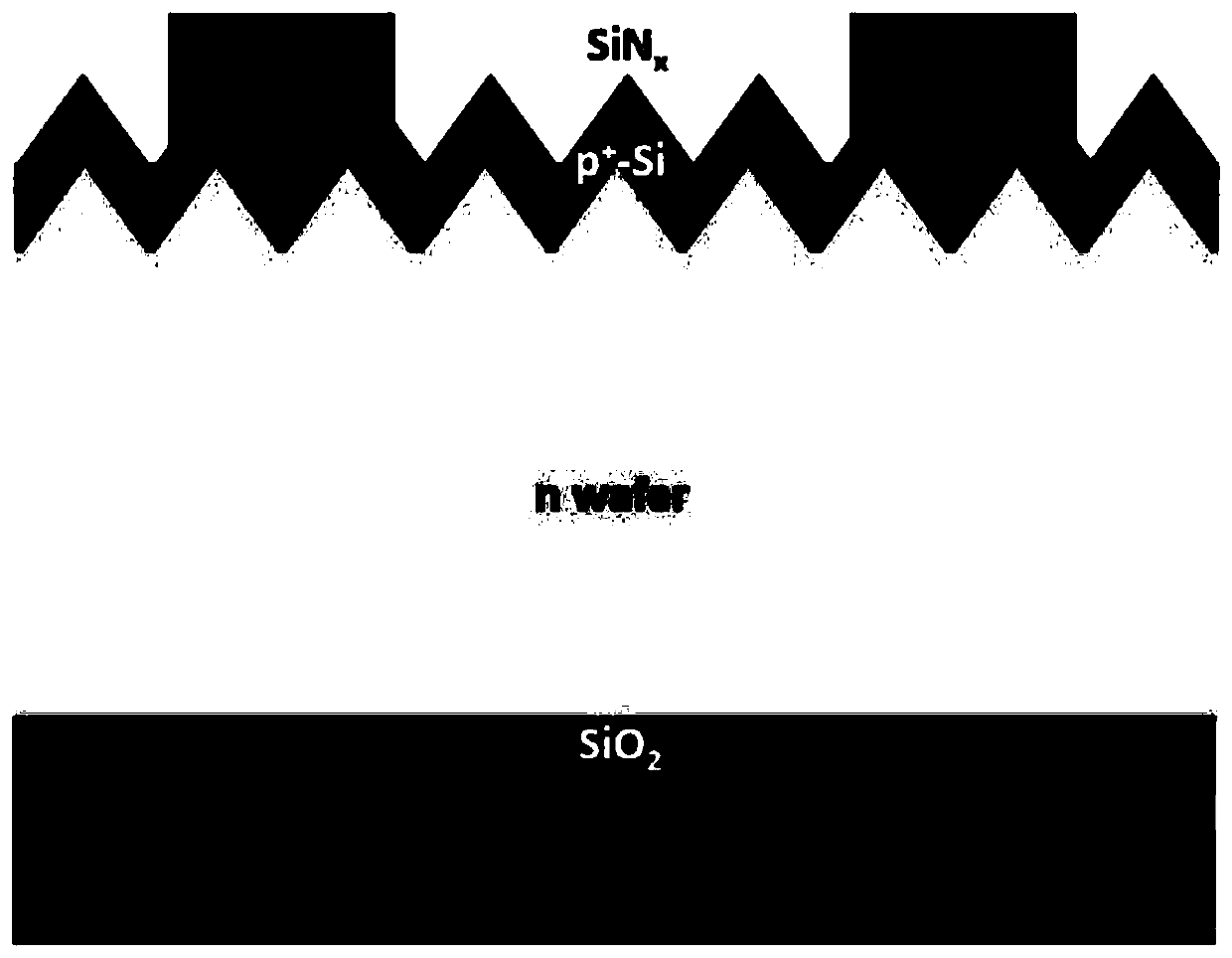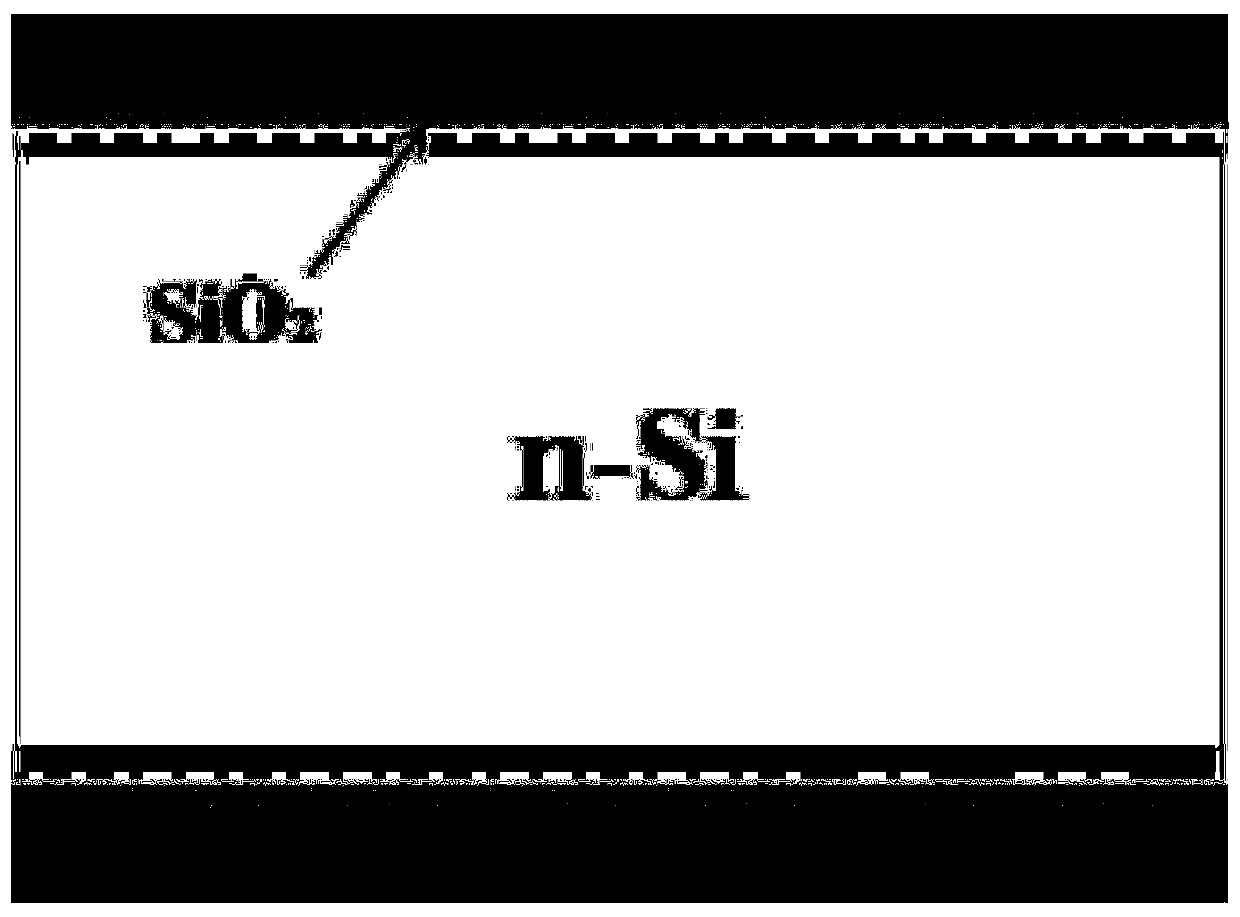Method for preparing polycrystalline silicon passivation contact structure through tubular PECVD
A contact structure and polysilicon technology, which is applied in the field of solar cells, can solve the problems of increasing production costs, reducing battery yield, and long process time, so as to save costs, improve yield, and reduce the number of processes.
- Summary
- Abstract
- Description
- Claims
- Application Information
AI Technical Summary
Problems solved by technology
Method used
Image
Examples
Embodiment 1
[0056] Using the n-type silicon wafer, the surface damage layer is removed, and the same structure is plated on both sides. The specific processing is as follows:
[0057] 1. Put the silicon wafer into the graphite boat after cleaning;
[0058] 2. Deposition of silicon oxide: substrate temperature 400 o C, with laughing gas (N 2 O) is the reaction gas, the flow rate is 3000sccm, the air pressure is 200Pa, the deposition power is 2000W, the radio frequency on-off ratio is 2ms: 10ms, and the deposition time is 120 seconds;
[0059] 3. Deposit I layer of phosphorus-doped amorphous silicon film on the silicon oxide layer: substrate temperature 600 o C, SiH 4 :H 2 : PH 3 =1500sccm: 10000sccm: 1500sccm, the air pressure is 250Pa, the deposition power is 2000W, the RF on-off ratio is 3ms: 45ms, and the deposition time is 600 seconds;
[0060] 4. Deposit II layer of phosphorus-doped amorphous silicon film on layer I of phosphorus-doped amorphous silicon film: substrate temperat...
Embodiment 2
[0064] Using the n-type silicon wafer, the surface damage layer is removed, and the same structure is plated on both sides. The specific processing is as follows:
[0065] 1. Put the silicon wafer into the graphite boat after cleaning;
[0066] 2. Deposition of silicon oxide: substrate temperature 400 o C, as carbon dioxide (CO 2 ) is the reactive gas, the flow rate is 5000sccm, the air pressure is 220Pa, the deposition power is 2500W, the radio frequency on-off ratio is 2ms:30ms, and the deposition time is 120 seconds;
[0067] 3. Deposition I layer of phosphorus-doped amorphous silicon film: substrate temperature 500 o C, SiH 4 :H 2 : PH 3 =1000sccm: 10000sccm: 1000sccm, the air pressure is 250Pa, the deposition power is 2000W, the RF on-off ratio is 3ms: 75ms, and the deposition time is 500 seconds;
[0068] 4. Deposition II layer of phosphorus-doped amorphous silicon film: substrate temperature 500 o C, SiH 4 :H 2 : PH 3 =1000sccm: 10000sccm: 1000sccm, the air p...
Embodiment 3
[0072] Using the n-type silicon wafer, the surface damage layer is removed, and the same structure is plated on both sides. The specific processing is as follows:
[0073] 1. Put the silicon wafer into the graphite boat after cleaning;
[0074] 2. Deposition of silicon oxide: substrate temperature 400 o C, with laughing gas (N 2 O) is the reaction gas, the flow rate is 3000sccm, the air pressure is 200Pa, the deposition power is 2000W, the radio frequency on-off ratio is 2ms: 10ms, and the deposition time is 120 seconds;
[0075] 3. Deposition I layer of boron-doped amorphous silicon film: substrate temperature 600 o C, SiH 4 :H 2 :B 2 H 6 =1500sccm: 2000sccm: 1500sccm, the air pressure is 250Pa, the deposition power is 1800W, the RF on-off ratio is 3ms: 45ms, and the deposition time is 600 seconds;
[0076] 4. Deposition II layer of boron-doped amorphous silicon film: substrate temperature 600 o C, SiH 4 :H 2 :B 2 H 6 =1600sccm: 10000sccm: 1600sccm, the air press...
PUM
| Property | Measurement | Unit |
|---|---|---|
| thickness | aaaaa | aaaaa |
| thickness | aaaaa | aaaaa |
| thickness | aaaaa | aaaaa |
Abstract
Description
Claims
Application Information
 Login to View More
Login to View More - R&D
- Intellectual Property
- Life Sciences
- Materials
- Tech Scout
- Unparalleled Data Quality
- Higher Quality Content
- 60% Fewer Hallucinations
Browse by: Latest US Patents, China's latest patents, Technical Efficacy Thesaurus, Application Domain, Technology Topic, Popular Technical Reports.
© 2025 PatSnap. All rights reserved.Legal|Privacy policy|Modern Slavery Act Transparency Statement|Sitemap|About US| Contact US: help@patsnap.com


